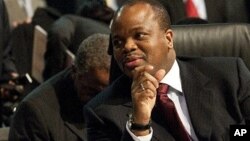A founding member of Swaziland’s banned opposition People’s United Democratic Movement (PUDEMO) party said Swazis cherish the institution of the monarchy, but hate the way the country is governed.
“First of all, we are Africans with a long background of monarchy," said opposition leader Mphandlana Shongwe.
"But in this country, the problem is with the government per se. You will find that on the ground, the people still like King Mswati III. But, the problem is his government is not delivering to these people,” he said.
The opposition leader's comments follow a Gallup public opinion survey that finds King Mswati III to be among Africa’s least popular leaders.
Shongwe said King Mswati III has failed to manage the country’s dire economic situation.
“As I speak, the country is in a very, very bad economic situation. That is why most of them are saying we must have multiple parties so that we can separate the institution of the monarchy and the government,” he said.
Government spokesman Percy Simelane ridiculed the poll results. “It’s like me coming to you and saying seven of your girlfriends say they no longer love you. What assurance do you have that I am not telling you all this because I want your girlfriends for myself,” he said.
Opposition leader Shongwe described Simelane as a government propaganda person hired to tell lies.
“The reality on the ground is that everybody, as I speak, is aware of the institution of the monarchy’s interfering with the government. [That] is what the people do not like. But, they are not saying we don’t want the king because the institution of the monarchy is an institution that takes care of our traditional values and cultural events. But, what we want is a situation where we are going to be able to elect our own government,” Shongwe said.
He said in order to save the institution of the monarchy it should be removed from day-to-day politics leading to the creation of a constitutional monarchy that is going to be above politics.
In March, the African Commission on Human and Peoples' Rights criticized the human rights record of the Swazi government.
It called on it to respect, protect, and fulfill the rights to freedom of expression, association, and assembly, in accordance with the government’s commitments under international law.
Shongwe said the opposition and civil society groups will continue to apply pressure on the monarchy to accept political change.
“The dangerous part of it is that you have never had anywhere in the world where institutions give up voluntarily, that is to say you will find that we have to put pressure on the institution of the monarchy to change,” he said.
He criticized some in the international community for not doing enough to support the democracy movement in Swaziland.
“First of all, we are Africans with a long background of monarchy," said opposition leader Mphandlana Shongwe.
"But in this country, the problem is with the government per se. You will find that on the ground, the people still like King Mswati III. But, the problem is his government is not delivering to these people,” he said.
The opposition leader's comments follow a Gallup public opinion survey that finds King Mswati III to be among Africa’s least popular leaders.
Shongwe said King Mswati III has failed to manage the country’s dire economic situation.
“As I speak, the country is in a very, very bad economic situation. That is why most of them are saying we must have multiple parties so that we can separate the institution of the monarchy and the government,” he said.
Government spokesman Percy Simelane ridiculed the poll results. “It’s like me coming to you and saying seven of your girlfriends say they no longer love you. What assurance do you have that I am not telling you all this because I want your girlfriends for myself,” he said.
Opposition leader Shongwe described Simelane as a government propaganda person hired to tell lies.
“The reality on the ground is that everybody, as I speak, is aware of the institution of the monarchy’s interfering with the government. [That] is what the people do not like. But, they are not saying we don’t want the king because the institution of the monarchy is an institution that takes care of our traditional values and cultural events. But, what we want is a situation where we are going to be able to elect our own government,” Shongwe said.
He said in order to save the institution of the monarchy it should be removed from day-to-day politics leading to the creation of a constitutional monarchy that is going to be above politics.
In March, the African Commission on Human and Peoples' Rights criticized the human rights record of the Swazi government.
It called on it to respect, protect, and fulfill the rights to freedom of expression, association, and assembly, in accordance with the government’s commitments under international law.
Shongwe said the opposition and civil society groups will continue to apply pressure on the monarchy to accept political change.
“The dangerous part of it is that you have never had anywhere in the world where institutions give up voluntarily, that is to say you will find that we have to put pressure on the institution of the monarchy to change,” he said.
He criticized some in the international community for not doing enough to support the democracy movement in Swaziland.





